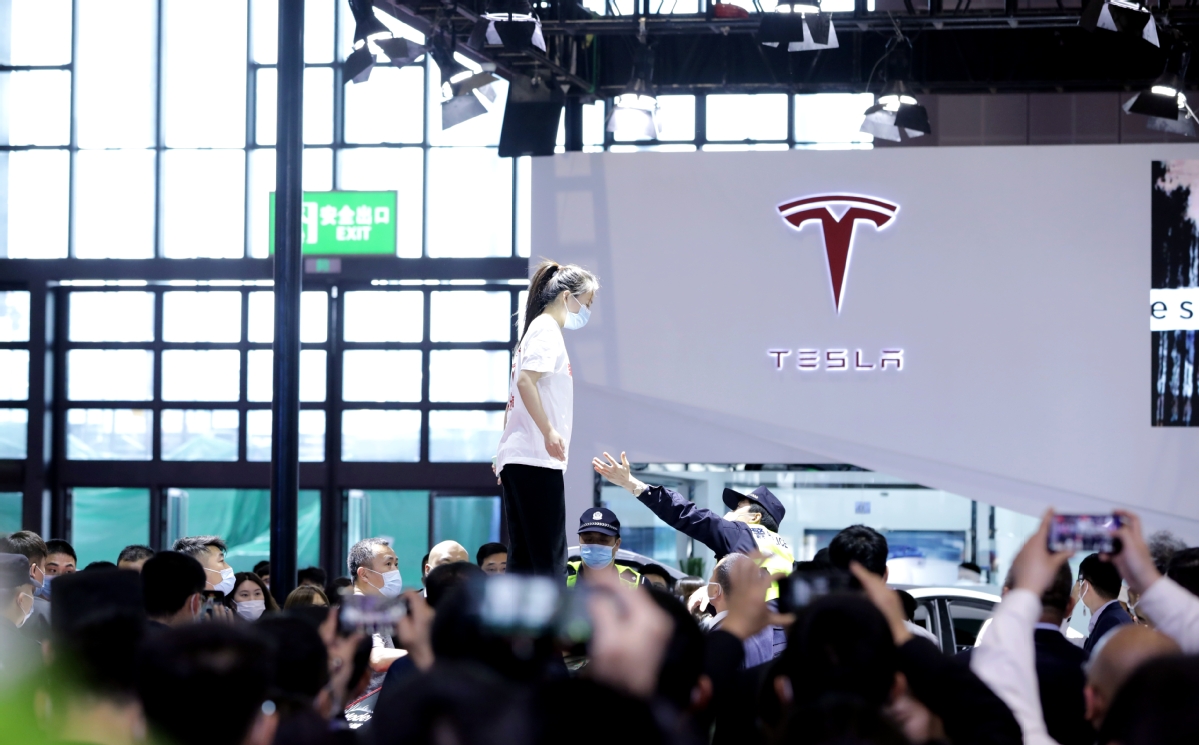Tesla hits a bump at Shanghai auto show


Electric carmaker criticized for its handling of unhappy customer
Elon Musk and his electric car company Tesla have a large following in China-the world's largest vehicle market-much to the envy of rivals.
Tesla was the bestselling maker of such vehicles in China last year, and last month was its best in the country to date, with 35,478 cars sold, according to the China Passenger Car Association.
However, a number of potential customers are deciding against placing orders and some owners are refusing to drive their Teslas to protest the way a customer who complained about an alleged brake failure was treated at the Shanghai auto show.
On April 19, the opening day of the show, which is held every two years, a woman got on top of a Tesla Model 3 car and shouted that the brakes did not work. She was quickly dragged away by security guards, who attempted to hide her from visitors with open umbrellas.
Footage of the incident taken by onlookers generated more than 150 million views on Sina Weibo within hours.
A business owner in Beijing surnamed Cui said, "I feel embarrassed, and I am worried that my Tesla Model 3 has the same problem, so I'm driving my Audi these days."
The protester, who was detained by police for disturbing public order, owns a Tesla Model 3 in Henan province, and her father was involved in a traffic accident in February while driving the car.
The woman claimed that the crash was caused by a technical problem with the car, but Tesla insisted the accident was due to excessive speed.
Soon after the protest, Grace Tao, a Tesla vice-president, told reporters: "There is no possibility Tesla will compromise ... I think she (the protester) is quite professional ... She has contributed to most of the negative news about Tesla recently."
The remarks made by Tao, who joined Tesla in 2014, escalated the protest.
Faced with mounting pressure, the company softened its stance, issuing a series of late-night statements. On April 20, it put out an apology and said it was carrying out a "self-inspection". Next day, it said it was "working with regulators for investigation".
On Thursday, Tesla disclosed data about the vehicle that crashed, generated before the accident. The data have not been independently verified.
Events took another turn three days later, when the woman protester, surnamed Zhang, was released from detention.
In a Sina Weibo post, Zhang said Tesla did not contact her or her family until the morning of her release from police detention. She added that the company should not disclose data about her vehicle without her consent, saying this was an invasion of privacy.
Yang Zhongyang, a senior auto reporter at Economic Daily, said the criticism leveled against Tesla centers mainly on how it responds to complaints, rather than referring to the quality of its vehicles.
In a news analysis, Reuters said Tesla defies industry convention, as it is based on a corporate culture that rarely admits mistakes.
The company has long been accused by customers of responding in an irresponsible manner to complaints about incidents such as battery fires, unexpected acceleration and failure to provide software updates.
Only two months ago, Tesla promised to "strictly abide by Chinese laws and regulations and always respect consumer rights "after the State Administration for Market Regulation urged it to heed consumer complaints.
Tu Le, analyst at research company Sino Auto Insights, said, "There have been constant complaints on social media about Tesla in China regarding quality and service issues, but they seem to have been largely ignored by the local team until Tuesday (April 20)."


















